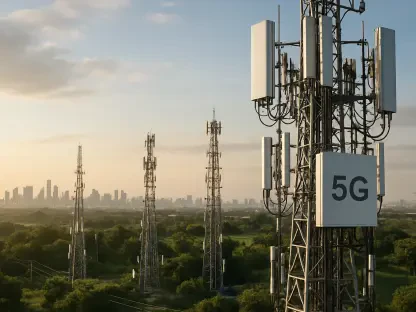The telecommunications reform bill moving swiftly through the Mexican Senate represents a pivotal turn in the direction of the country’s digital governance and infrastructure policy. Spearheaded by the ruling Morena party, this bill brings comprehensive changes that have triggered widespread debate over its potential impact on free speech and governmental control. It promises a major leap towards universal broadband access and affordable connectivity, marking a step forward in aligning with Mexico’s past constitutional reforms. However, concerns have been raised over its rapid progression and perceived potential for overreach, particularly in regulating digital platforms, which has garnered intense scrutiny and protest from various sectors.
The Vision of Digital Access and Equity
Universal Broadband Access
Central to the reform’s objectives is the commitment to ensuring universal broadband access, a dedication that underscores digital equity and the public interest. This approach is intended to address the significant socio-economic digital divide in Mexico, which predominantly affects impoverished and rural areas that currently lack sufficient digital infrastructure. With a large portion of the population living without reliable internet access, bridging this gap is seen as essential for fostering social inclusion and economic development. The reform’s proponents argue that a more connected nation can stimulate educational opportunities, economic growth, and social mobility, offering a substantial improvement in quality of life for millions of Mexicans.
The proposal’s focus on universal broadband access reflects broader global trends recognizing digital connectivity as a vital public utility. By making affordable and reliable internet available to all, the reform aims to integrate marginalized communities into the digital economy, enabling wider participation in educational and professional opportunities. This strategic push towards digital inclusion is envisaged not only as a path to enhance communication but also as a mechanism to empower citizens with better access to information and services, thus contributing to Mexico’s progress in achieving broader democratic engagement and socio-economic parity.
Redefining Regulatory Bodies
In addition to universal access, the reform bill proposes significant changes in the regulatory landscape by dismantling the Federal Telecoms Institute (IFT) and introducing the new Digital Transformation and Telecoms Agency (ATDT). The creation of ATDT is geared towards modernizing the management of public radio spectrum, networks, and digital services. This agency will have the authority to grant commercial telecoms concessions to public entities, focusing primarily on wholesale services rather than directly serving consumers. The restructuring of regulatory bodies aims to streamline governance and potentially foster an environment conducive to innovation and efficiency within the telecommunication sector.
This transition from IFT to ATDT has been framed as a logical progression to better equip Mexico with the tools necessary to support its digital future. Proponents of the reform suggest that this change will enhance the country’s capability to respond dynamically to evolving technologies and market demands. However, this realignment also raises questions about the concentration of power and oversight. Ensuring transparency and accountability within the new regulatory framework will be crucial to preserving public confidence and achieving the reform’s intended objectives without undermining consumer interests or market competitiveness.
Controversial Aspects and Concerns
Potential for Censorship
Among the most contentious elements of the bill are the provisions perceived to enable government-driven censorship, particularly through clauses that could allow for the blocking of digital platforms failing to comply with regulatory provisions. Critics raise alarms over the lack of clarity concerning what constitutes a “competent authority” empowered to take such actions, as well as the vague criteria defining non-compliance. The bill’s hasty progression through legislative processes without thorough scrutiny further amplifies fears of potential misuse, suggesting a pathway through which measures might be employed to limit freedom of expression and access to information across digital mediums.
These concerns resonate amid broader discourse about balancing security and regulation with fundamental rights and freedoms within the digital sphere. The stakes are high in terms of preserving the integrity of open and free internet spaces that facilitate the free flow of ideas. Observers worry that broad interpretative powers granted by the bill could be misused, leading to unjustified blockages of platforms like Facebook or YouTube, thus stifling dissenting voices and public debate. The potential for such an outcome highlights the need for more precisely articulated legislative language to safeguard against encroachments on digital freedoms.
Opposition Voices
Voices of opposition express reservations that the breadth of these reforms, especially their potential to infringe on civil liberties, is unnecessary and unduly extensive. Concerns are rooted in the view that addressing issues like foreign propaganda does not warrant sweeping constitutional changes, suggesting instead that such matters could be resolved through existing regulatory mechanisms or with targeted legal adjustments. Critics argue this approach risks overextending governmental power and question the ruling administration’s underlying motives, positing that it may leverage public concerns about propaganda to push through measures that could curb free speech.
The opposition sees the reform as emblematic of a broader tendency toward authoritarian governance masked as modernization or progress. These apprehensions are fueled by the rapid pace at which the bill has advanced, raising suspicions about the potential for executive overreach. Questions persist regarding the balance between necessary regulatory oversight and preserving democratic freedoms, with critics demanding more deliberate and transparent dialogue to refine the legislative framework before it becomes law. This pushback highlights the critical need for checks and balances to ensure reforms effectively balance the twin imperatives of progress and protection of civil liberties.
Political Maneuvering and Public Perception
Government Stance
In response to mounting concerns over potential overreach and censorship, President Claudia Sheinbaum has attempted to reassure skeptics by expressing openness to amending contentious provisions. Her administration emphasizes a commitment to aligning the reform with Mexico’s democratic values and infrastructure equity, asserting that the goal is not to stifle free speech but to modernize telecommunications governance in ways that ensure greater access and fairness. Such assurances aim to quell the skepticism surrounding the bill, proposing dialogue and potential modification to alleviate fears of unwarranted censorship and regulatory abuse.
The president’s conciliatory stance is portrayed as a strategic maneuver to navigate the complex political terrain the bill has engendered. By opening the door to revisions and clarifications, the government seeks to earn broader legislative and public support, underscoring its dedication to responsible governance. The administration’s willingness to engage with critics reflects an acknowledgment of the importance of consensus in shaping a reform that serves the public interest without compromising fundamental rights. This approach could help mitigate tensions and foster a more collaborative environment for refining and implementing the reforms.
Broader Implications
The telecommunications reform bill rapidly advancing through the Mexican Senate signifies a crucial shift in the country’s approach to digital governance and infrastructure policies. Led by the ruling Morena party, this legislation proposes sweeping modifications that have sparked significant debate regarding their potential impact on free speech and governmental oversight. The bill aims to revolutionize digital accessibility by promising universal broadband and more affordable connectivity, aligning with Mexico’s previous constitutional amendments. Nonetheless, the pace at which this bill is progressing and its perceived potential to overreach, particularly concerning regulation of digital platforms, has drawn intense scrutiny. Critics argue this could lead to increased governmental control, sparking protests from a range of sectors worried about implications for free expression and digital freedom. As the debate continues, this reform embodies Mexico’s broader struggle to balance technological advancement with fundamental civil liberties and regulatory control.









